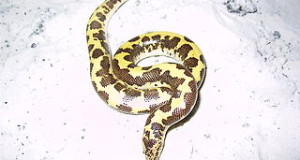 Studies in several countries recently hinted that snakes may be declining worldwide, in much the same manner as has been shown for scores of amphibian species (please see article below). This month (October, 2010), scientists at the University of Arizona have documented massive declines in both snakes and lizards in a well-protected reserve, adding to fears that major extinctions lie ahead.
Studies in several countries recently hinted that snakes may be declining worldwide, in much the same manner as has been shown for scores of amphibian species (please see article below). This month (October, 2010), scientists at the University of Arizona have documented massive declines in both snakes and lizards in a well-protected reserve, adding to fears that major extinctions lie ahead.
Frightening Similarity to Earlier Studies
Populations of 8 snake and 6 lizard species in Arizona’s Organ Pipe National Park were found to have declined by 50% between 1998 and 2002, and have not recovered. The reptiles in question had been monitored carefully for 22 years, so accurate baseline numbers were available. The species that showed significant declines included Regal Horned, Zebra-Tailed and Red-Back Whiptail Lizards, Mojave and Western Diamondback Rattlesnakes, Gopher Snakes and King Snakes.
These results echo those of studies conducted in Europe, Africa and Australia, where populations of 11 snake species crashed during the same years. In Mexico, local populations of 48 types of lizards have gone extinct since 1975.
Climate Change Implicated
While definite conclusions as to cause are impossible to draw, much of the available evidence points towards climate change. The study area has become hotter and drier in recent years, and the snakes and lizards that declined most precipitously were those sensitive to rising temperatures and drought.
 Snakes adapted to desert conditions fared well. Tree-dwelling and nocturnal lizards, which can more easily escape temperature extremes than diurnal ground-dwellers, did not decline in numbers.
Snakes adapted to desert conditions fared well. Tree-dwelling and nocturnal lizards, which can more easily escape temperature extremes than diurnal ground-dwellers, did not decline in numbers.
Further Reading
You can learn more about southern Arizona’s reptiles and other wildlife, and find photos, here.
Please see Study Hints at Global Snake Decline for a summary of earlier research.
 That Reptile Blog – Reptile, Amphibian and Exotic Pet Care and Information
That Reptile Blog – Reptile, Amphibian and Exotic Pet Care and Information



Thank you for this article Frank.
I have recently decided to persue a career in Herpetology. I’ve decided that since I enjoy keeping frogs so much and have been a moderator on FrogForum.net helping many amphibian owners with their pets thatthis is something that I feel always needs more bodies in the field to help out however they can. I know it will be a hard road going back to school for a career in this field especially since I will be 30 thjs year and am off to a late start Lol! No matter though. I enjoy the hobby and so will be eager to learn much more. Maybe even see if my Exotic Vet will take on an appentice.
Anyway your blogs are always very informative and a great read. Lots if information packed into few paragraphs and never boring. Keep it up!
Best Regards
Jerrod(GriftheGreat)
Hi Jerrod,
Nice to see you hear, thanks for posting, and for the kind words. Personal situations vary, of course, but in the abstract 30 is not too late at all..I worked in the pet and animal import trade from an early age, but became an attorney before going into zoo work full time; twisted paths can be long and expensive, but well-worth the effort if this is your passion; not much tops enjoying your career. Here’s an article on herpetology carers; there are other links under “further reading” and in Part I. This one is on Herp-Oriented Volunteering There are many other options, of course. Please let me know if you need anything, and please keep me posted…I recall how excited I was when I made the same decision, so enjoy and keep at it!
Please post as often as you’d like, on your path or re your experiences with animals as well, Best, Frank